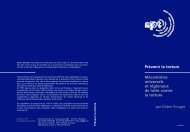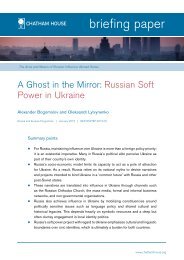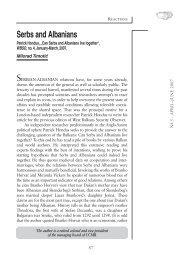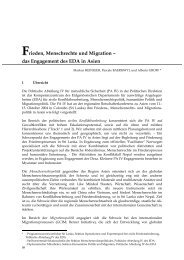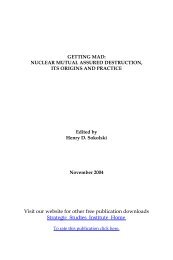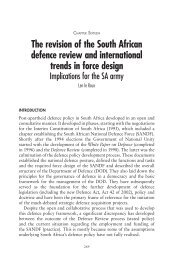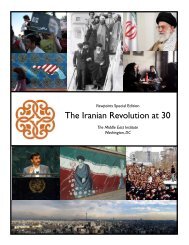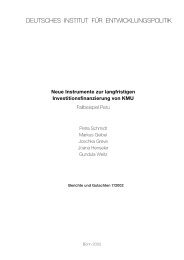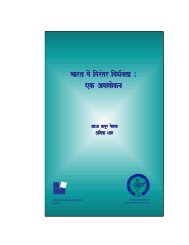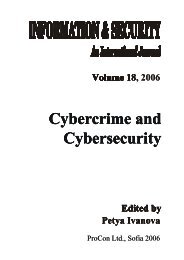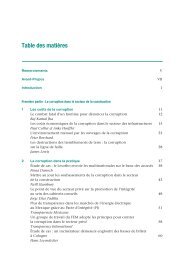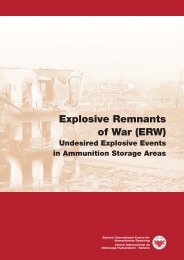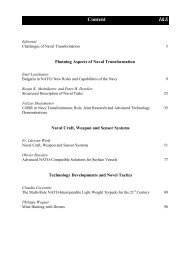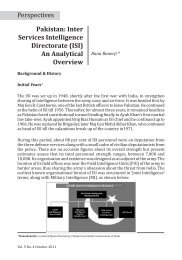Andreas Stamm Eva Dantas Doris Fischer Sunayana ... - ETH Zürich
Andreas Stamm Eva Dantas Doris Fischer Sunayana ... - ETH Zürich
Andreas Stamm Eva Dantas Doris Fischer Sunayana ... - ETH Zürich
Create successful ePaper yourself
Turn your PDF publications into a flip-book with our unique Google optimized e-Paper software.
1.1 Recognising the challenge – a historical perspective<br />
10<br />
<strong>Andreas</strong> <strong>Stamm</strong> et al.<br />
The challenge of how to reconcile socio-economic needs and environmental requirements<br />
has by no means just recently been recognised. Already in the early 1970s, the publication<br />
(in 1972) of the first Club of Rome Report (“The Limits to Growth”) and the first oil crisis<br />
of 1973 triggered an international scientific and public debate on how to deal with the fact<br />
that a growing world population with increasing levels of per capita material consumption<br />
cannot easily be harmonised with the limited resource base and sink capacities of the<br />
globe. The Global 2000 Report to the President, commissioned by US-President Jimmy<br />
Carter in 1977, had a similar jolting effect, at least within a global community of people<br />
open to information and knowledge, challenging conventional thinking and business as<br />
usual concepts of life. 3<br />
Interestingly, the environmental debate and the development debate were thrust simultaneously<br />
into the global discourse. In 1970, the first formal international commitment was<br />
made to undertake efforts to commit at least 0.7% of the rich countries’ gross domestic<br />
product (GDP) to official development assistance (ODA). 4<br />
In the 1970s, development issues and the harsh realities in developing countries were increasingly<br />
realised and discussed by concerned observers in the industrialised countries,<br />
triggered e.g. by the 1973 coup d’état in Chile, the 1979 revolution in Nicaragua and the<br />
cruelty of apartheid in South Africa. In 1980 – and practically at the same time the Global<br />
2000 Report was issued - the report of the “Independent Commission on International Development<br />
Issues” (“Brandt Report” - commissioned by World Bank President McNamara)<br />
appeared, calling for urgent action to overcome poverty.<br />
Thus, the message that the perspectives for continued quantitative growth of material consumption<br />
will be limited and the awareness of the unacceptable ethical implications of the<br />
existing global welfare divide reached the critical parts of the global public simultaneously,<br />
and without advocating positions inimical to one another. However, they have since<br />
then not been brought together in any particularly systematic way. The challenge of how<br />
to meet the ethical dilemma between the need for global social equity on the one hand and<br />
the need to preserve natural resources for future generations (also on a global scale) on the<br />
other has still not really been resolved.<br />
There have been attempts to conceptually de-link development from economic growth,<br />
e.g. based on the approach of satisfaction of basic needs, prominent especially during the<br />
1970s. However, the growth target for that decade, the Second UN Development Decade<br />
(1971-1980), was an average of 6% for all developing countries, a figure then thought to<br />
be required for a per capita GDP growth of 3.5% (UN 1970, para 13 and 14). Part of the<br />
frustration with this (and other) Development Decades was related precisely to the fact<br />
that the growth rates of developing countries clearly failed to achieve these envisaged high<br />
averages, and this in turn has lowered the potential for achieving increases in needs satisfaction.<br />
3 One indicator that this community was not too small is that the print version of “Global 2000” sold more<br />
than 1.5 million copies.<br />
4 UN General Assembly (1970, Resolution, Paragraph 43).<br />
German Development Institute / Deutsches Institut für Entwicklungspolitik (DIE)



